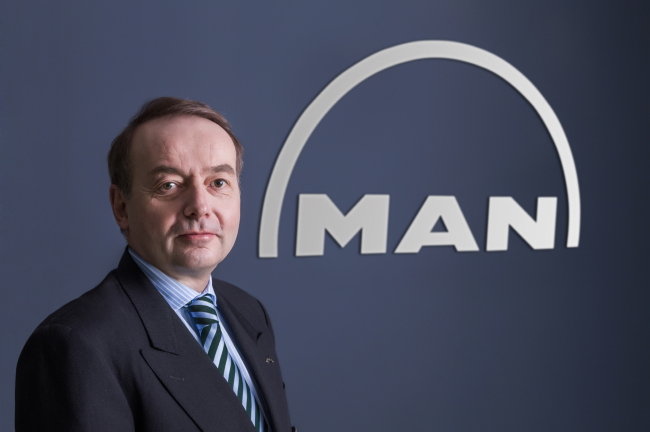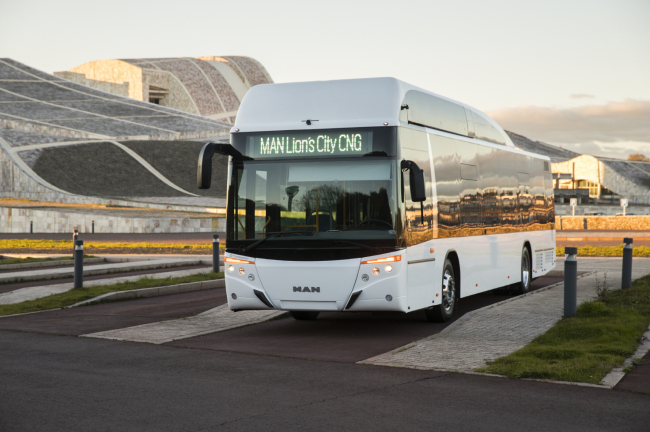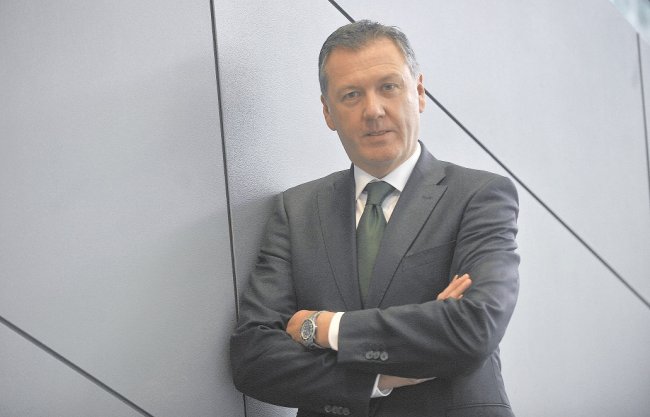MAN Truck & Bus Korea, the local distributor of the German automaker, recently opened its new headquarters and service center in Yongin, Gyeonggi Province, in a $10 million investment looking to expand its presence in the domestic market.
In 2016, MAN sales in Korea jumped 36 percent from the previous year, the best performance in the world truck market last year, according to the company. MAN sold 1,545 units last year, the highest number of units since the company entered the Korean market.
In the company’s 16th year in Korea, MAN has experienced a near seven-fold growth.
In the past six years in particular, MAN saw a 680 percent spike in sales, an epochal achievement that company heads attribute to their dialogue with its local customer base to keep on track of the market’s demands.
 |
Max Burger, president of MAN Truck & Bus Korea (MAN Truck & Bus Korea) |
“You really have to listen to the customers and determine the right product for the demand here,” said Max Burger, president of MAN Truck & Bus Korea, during an interview with The Korea Herald at the new MAN Truck headquarters on Tuesday.
“You cannot just take the European truck and then bring it here, just put a price tag on it and that’s it,” Burger continued. “Everything is different, we have different regulations so the habits are different and the roads are different … you have to adapt to what the customers really want and what the customers really need. We have been really intensively working on that and I think we have been successful.”
Looking to continue its annual market share growth, MAN recently unveiled its “MAN Lion’s City,” a low-floor city bus series fueled by natural gas, for the first time in Asia at the Seoul Motor Show on Thursday.
 |
MAN Truck & Bus Korea‘s Lion’s City low-floor city bus series fueled by natural gas (MAN Truck & Bus Korea) |
Burger announced that the company has agreed to launch its compressed natural gas local buses and 28 double-deckers to various transportation operators in Gyeonggi Province, noting that Korea can expect to see its green buses hitting the streets by the end of the year.
“We developed this low-floor, three-door CNG bus, which in Europe is nothing special because we have been using it for years, but in Korea, this does not exist,” Burger said.
“This is something really new (in the domestic market) ... we think that for our customers there will be a big benefit. And also for the final customers -- the passengers -- it will be a big benefit because it is easier to go into and go out of, it will be much faster at the bus stops,” he said, adding that the fuel efficiency and environmentally conscious benefits of the company’s buses are a win-win for all parties involved.
Equipped with a compressed natural gas engine, it is said the MAN’s buses emit 17 percent less carbon dioxide as well as offer roughly 15 percent lower operational costs when compared to local diesel-fueled buses.
 |
Heinz-Jürgen Löw, director of sales and marketing for MAN Truck & Bus (MAN Truck & Bus Korea) |
The company also said it later plans to advance further into the local cargo business and increase its number of service centers nationwide. MAN truck is gearing up to open a new training center and pre-delivery inspection center in Pyeongtaek, Gyeonggi Province.
“By growing the business, we also have to grow our service networks,” Heinz-Jürgen Löw, director of sales and marketing for MAN Truck & Bus, explained.
“It’s an exceptional growth and exceptional investment we are undertaking in Korea,” Löw said, adding that the company is scheduled to establish five more services outlets this year.
By Julie Jackson (
juliejackson@heraldcorp.com)









![[Today’s K-pop] Blackpink’s Jennie, Lisa invited to Coachella as solo acts](http://res.heraldm.com/phpwas/restmb_idxmake.php?idx=644&simg=/content/image/2024/11/21/20241121050099_0.jpg)
